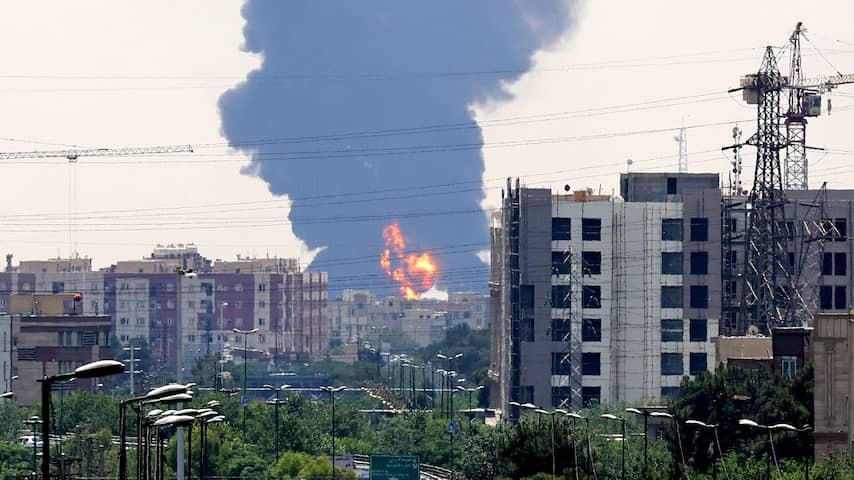
Following the attack on an Iranian nuclear facility, the United States is anticipating a military response from Iran. Iran faces a dilemma: to demonstrate strength or to prevent the Americans from retaliating even more forcefully.
The American bombing of the Iranian nuclear development site Fordow has placed the war between Iran and Israel in a new situation. The world is now watching Iran: how will that country react now that the United States has also attacked Iranian targets?
It is difficult to predict what Iran will choose, Middle East experts tell NU.nl. Several scenarios are conceivable, each with advantages and disadvantages for Iran.
For example, if Iran attacks American military bases in the Middle East, it could ultimately be negative for Iran, says Middle East expert Gertjan Hoetjes. The American army could use that as a reason for a new attack on Iran, where the defense has been considerably weakened in recent weeks.
But on the other hand, the Iranian regime does not want to simply ignore the attack. “Not reacting here can also be seen as a sign of weakness,” says Hoetjes.
Possible attack on American base
The most likely reaction is such an attack on an American military base in the Middle East. American bases are in various countries in that region: including Bahrain and Saudi Arabia, but also in Iraq and Jordan.
There are a total of about 40,000 American soldiers in the Middle East. The Americans are there – like other Western countries – for various reasons, such as countering terrorism and protecting trade.
Iran then faces the choice of how large that counterattack should be, says Middle East expert Paul Aarts. He expects the US to react to a “serious” attack and then get further involved in the war. Aarts is thinking of an attack in which American personnel are killed.
A more “symbolic” attack is another option, says Aarts. In such a case, Iran only attacks infrastructure on American bases. If there are no casualties, an American response may not occur.
But even such a smaller attack has risks. “Think of a mistake, or a projectile that cannot follow the planned route,” says Aarts. “Then the situation can still escalate.”
Earlier a ‘symbolic’ counterattack
In 2020, Iran also carried out such a smaller attack after the American army killed the high Iranian general Qassem Soleimani. The killing of Soleimani was seen by Iran as a serious act of aggression, but the country ‘only’ responded with a symbolic smaller attack on a base.
“Some American soldiers were injured. Perhaps miraculously, because it could have ended differently. And with that it was done.”
Aarts thinks that Iran still has enough possibilities for such a counterattack, even though Israel has disabled a lot of equipment in recent weeks. We do not know exactly how large the capacity is; Iran always keeps that a secret, as other countries like Israel also do.
“I suspect that Iran does indeed still have something up its sleeve,” says Aarts. “We know that they have produced quite a few rockets and drones in recent years; they also export to Russia.”
Closing the Strait of Hormuz
Another scenario that is mentioned is that the Strait of Hormuz is closed. That sea arm is the only access route to the Persian Gulf, south of Iran.
Closing it would affect global trade, because about 20 percent of the world’s traded oil passes through the Strait of Hormuz. A lot of oil is extracted in the countries on the Persian Gulf.
And such a closure would also cause an increase in the oil price, says Hoetjes. And with that Iran can try to damage the American economy.
But that retaliatory action also has a consequence: the oil does not only go to the United States. Asian countries are also important trading partners, such as China, Japan and Malaysia. Closing the Strait of Hormuz can therefore also have consequences for Iran’s relationship with China.
World War III is unlikely
NU.nl readers wondered whether Iran will also attack targets on American territory. And also whether this could unleash a Third World War.
The experts do not see either scenario happening. Due to the location of the US and the good defense of that country, Iran has little to gain from an attack. Moreover, an attack would certainly lead to escalation.
And for a Third World War you need the participation of other major powers. “China, Russia and the major EU countries will absolutely not be willing to get militarily involved in this conflict,” says Aarts.
There are also other possible reactions and consequences. For example, Hoetjes points out that Iran can also respond with cyber attacks. But the exact Iranian possibilities for this are unclear.
And then there is also an increased risk of terrorist attacks on American embassies. These do not even have to be carried out on behalf of Iran, says Aarts. Anger over the actions of Israel and the US could be a motive for terrorists. But ultimately, everything is still guesswork; we only really know which counterattacks to expect once they have taken place.